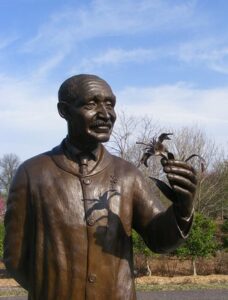For #BlackHistoryMonth, we at YSJ Geography are going to be publishing a blog post every weekday, celebrating black landscapes, people, and histories in geography and the environment!
Follow this blog via our Twitter and Facebook accounts to keep up to date.

Credit: National Park Service (US)
George Washington Carver rose from slavery to become a great American agricultural scientist and a global pioneer in promoting sustainable food production to feed a growing and impoverished population. A notable aspect of his work was with crop rotation (growing a series of different types of crops in the same area across a sequence of growing seasons to increases organic matter in the soil, improve soil structure and reduce soil degradation), encouraging farmers to begin alternating cotton crops with plantings of sweet potatoes or legumes, that subsequently restored nitrogen to their soils while simultaneously increasing cotton yields and providing alternative nutritious crops that are beneficial for human consumption.
He was also notable for developing hundreds of products using the peanut (which weren’t classified as a crop until Carver’s work), sweet potatoes and soybeans. George Washington Carver is celebrated for his significant impact on how farmers serve as stewards and conscientiously utilise the Earth’s natural resources.

Credit: John W Schulze